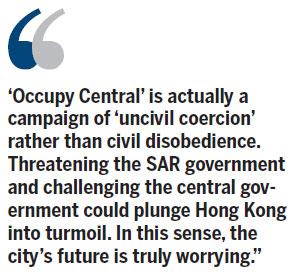Mainland-backed HK to disappoint doomsayers
Updated: 2014-06-27 05:24
By Bob Lee(HK Edition)
|
|||||||||
I refer to an article published by Bloomberg on June 22 entitled "Is This the Death of Hong Kong?
The commentary posited that "perhaps rumors of Hong Kong's demise weren't exaggerated after all", hinting at the bankruptcy of the "One Country, Two Systems" policy which has served Hong Kong so well for 17 years.
As many know, "The Death of Hong Kong" carried by Fortune Magazine in June 1995 was one of the most quoted articles on Hong Kong's handover to China. The article predicted that under Chinese rule Hong Kong would lose its appeal as an international and financial hub.
Equally memorable was the moment when the same publication retracted its prediction and admitted in a further article 12 years later that: "Well, we were wrong reports of Hong Kong's death have been greatly exaggerated."
Now, 30 years after the signing of Sino-British Joint Declaration, Bloomberg and other peers - to their apparent delight - are recalling Fortune's initial prediction. One headline in the Chicago Tribune announces that Fortune's "Death of Hong Kong" prediction may now be correct.
Employing emotive words such as "unnerving", "bizarre" and "chilling", Bloomberg's piece by William Pesek virtually demonizes the white paper published by the State Council.
A close reading of the article reveals a great deal of hogwash spouted by the author because of his lack of knowledge of China. He claims for instance, that "Hong Kong has nothing to learn from Beijing" and "China needs to become more like Hong Kong, not the other way around". This type of senseless remark merits a response. China's economic miracle has generated surprise and admiration around the world. Three decades of double-digit GDP growth have enabled China to successfully implement the greatest poverty alleviation campaign in history. China is now the world's second largest economy. Don't you think China is qualified to offer the world something of value, something worth learning?

The author says that if President Xi Jinping "pushes too far" more people will join the looming "Occupy Central" campaign. Pesek says Hong Kong people are "miserable that their world-class economic system died a death entirely of Beijing's making". Perhaps the best way to counter such groundless, absurd claims is to examine the facts.
Since Britain handed over Hong Kong in 1997, the SAR has not only survived its return to Chinese sovereignty, but continued to thrive. The "high degree of autonomy" promised by the central government has served the territory remarkably well. The HKSAR has its own currency, taxation, a world-class financial system and an independent judiciary. Hong Kong still ranks the third most important financial hub after New York and London; Hong Kong dollar is the eighth most-traded currency globally - no mean feat given Hong Kong's size. John M. Carroll, professor of history at the University of Hong Kong noted in his new book A Concise History of Hong Kong that even British expatriates, some with family ties to Hong Kong dating back to the late 1800s, continue to make more money than they ever could in Britain.
Compared with many former colonies, Hong Kong's post-colonial experience has been successful. Despite dismal, pessimistic predictions about the city's post-handover future, it remains one of the freest, safest and wealthiest places on earth.
Lately, particularly in the last month, a string of events - the opposition's planned "Occupy Central" campaign, a plebiscite that has no legal-bearing, the storming of Legislative Council by radical protesters, and the release of the white paper, has again dragged Hong Kong society into heated debates over the question of "One Country, Two Systems".
This situation obviously prompted Bloomberg's pundit to declare "it is no longer impossible to imagine the end of 'One Country, Two Systems'". Such irresponsible comments only help to exacerbate tensions which are already simmering in Hong Kong.
Bloomberg's piece also rounded on China Daily for its "arrogant rhetoric". We feel the need to set the record straight. Though a minority of people, both locally and overseas, may find our views sometimes hard to take, we are simply telling the truth and voicing genuinely held beliefs. We believe that "Occupy Central" is actually a campaign of "uncivil coercion" rather than civil disobedience. Threatening the SAR government and challenging the central government could plunge Hong Kong into turmoil. In this sense, the city's future is truly worrying.
The author is a senior editor of China Daily Hong Kong Edition. boblee@chinadailyhk.com
(HK Edition 06/27/2014 page9)